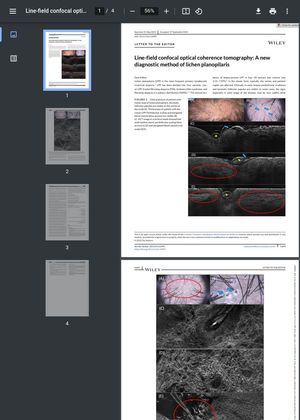Line-Field Confocal Optical Coherence Tomography: A New Diagnostic Method of Lichen Planopilaris
October 2023
in “
Skin research and technology
”

TLDR LC-OCT is an effective new method for diagnosing classic lichen planopilaris.
The study "Line‐field confocal optical coherence tomography: A new diagnostic method of lichen planopilaris" investigates the use of Line-field confocal optical coherence tomography (LC-OCT) as a diagnostic tool for lichen planopilaris (LPP), a common type of lymphocytic cicatricial alopecia. The study included six patients (four females and two males; mean age 47 years) with classic LPP. LC-OCT, a new imaging technique, was used to perform in vivo biopsy of the skin and mucosa, providing vertical and horizontal images as well as three-dimensional reconstructions. The LC-OCT images revealed key diagnostic features of LPP such as infundibular hyperkeratosis, perifollicular lichenoid cell infiltrate, and coarse dermal fibres surrounding the hair follicle. These features were not observed in healthy sites. The study concludes that LC-OCT is a promising tool for real-time visualization of major diagnostic features of classic LPP, but further investigations are needed to validate these findings.




